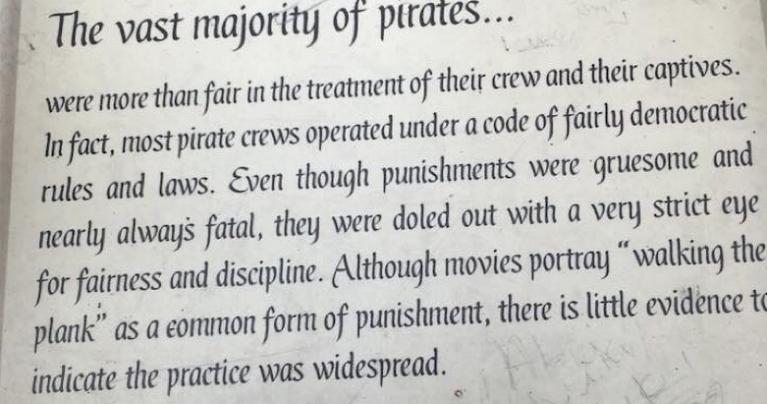
I never thought I would have to say this, but pirates were not good. Getting rid of pirates in the Caribbean was a good thing and the pirates we have now are bad guys (and they are almost all guys). Walt Disney made a ride where pirates engaged in all the vices of the flesh and ended up defeated and dead. Modern folks have subverted the ride by making the pirates the heroes and so have ended up softening some of the deeds of the flesh: some sins are out, but murder and looting cities is still “in.”
Follow this up with an endless series of once popular films on piracy where the heroes are all pirates and the former good guys (the pirates hunters) are all bad and you have a growing memory hole. As a kid, pirates were one of my first interests and no matter what I read, the conclusion was the same:
Basing your life on looting and killing people is not good.
We are now at a stage both worriedly censorious and libertine. Pirates are praised, but when we see piratical behavior in our leaders we (rightly) unleash Oprah. Yet still, we cannot bring ourselves to quite admit that undermining the old moral order was not so good. My sons ran into the this sign at a resort and the lunacy writtten thereon makes the point:
The vast majority of pirates were more than fair in the treatment of their crew and their captives. In fact, most pirate crews operated under a code of fairly democratic rules and laws. Even though most punishments were gruesome and nearly always fatal, they were doled out with a very strict eye for fairness and discipline. Although movies portray “walking the plank” as a common form of punishment, there is little evidence that indicate the practice was widespread.
This fruit of our historical lunacy where we refuse facts in favor of ideology is so crazy one is tempted to leave it alone, if it did not point to three features of the lies about history in our time. Crazy cranks, let’s just call them the crazy, are taken seriously by using three techniques.
The crazy admits something negative: against interest.
Note how clever this little sign was: it admits the pirates practiced “grusesome” punishment. Since this is against interest, if one wants to defend pirates, the reader might think the sign fair until he remembers that the sign is defending pirates.
By definition, the pirate is a man who makes his living looting and killing innocent people for money. The pirate may have numerous good traits (though the ones listed are lies), but he turns anything good to a vile practice. It might be that Nazis made trains run of time and they certainty caught a mass murderer, but Nazis remain bad.
You cannot improve Nazis by listing their virtues and mentioning a few minor vices. Why? Nazis were committed to genocide. That trumps all the good or the minor evils.
The crazy has something right. By disabusing one old legend, the crazy can start a new one.
Movies notwithstanding, pirates did tell their victims to walk the plank. Good for pirates. They simply killed thousands with other gruesome and bloody means. However, the crazy “historian” has our trust, because he has corrected an obvious error in popular perceptions of pirates.
The crazy goes big. He goes for it.
If you are going to lie, simply claim something so crazy that it is hard to refute. If you take a murderous, inchoate, band of ruffians who squandered fortunes while creating little that endured and simply proclaim them liberteraian heroes . . . You get attention.
Pirates are bad: killing, stealing, looting as a business is not a good thing for culture. Let’s remind ourselves that such counter-intutitive ideas are mostly wrong. Go read Treasure Island and go back to celebrating the pirate catchers. Let’s purge our own politics of pirates . . . And ignore those who defend them by crazy tricks.











